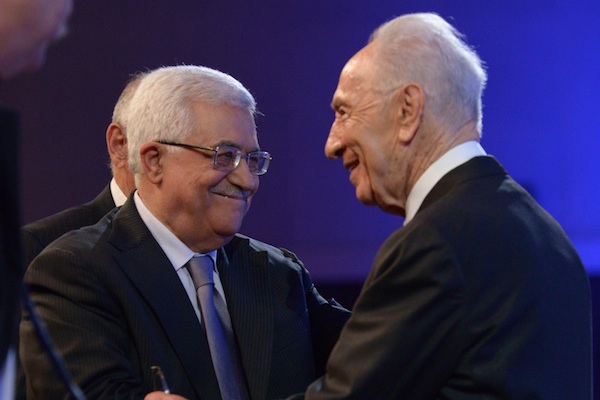While leaders around the world coordinated their visits with the Foreign Ministry, the Palestinian president was forced to ask permission from an occupying army. The irony.
As a matter of diplomatic protocol, visits by heads of state are handled by the Foreign Ministry. The issue is so immutable that when the Israeli Foreign Ministry staff went on strike a few years, even a strategically important visit by Russian President Dmitry Medvedev had to be canceled.
Therefore, when former Israeli President Shimon Peres died earlier this week, the Israeli Foreign Ministry opened an emergency situation room to handle the expected flood of foreign leaders and heads of state lining up to attend the state funeral on Friday. All of the logistics of those visits, as is protocol, are being handled by the Foreign Ministry.
Except for one. Palestinian President Mahmoud Abbas had to make his request to the Israeli army. What irony that in order to attend the funeral of the man with whom he negotiated Palestinian autonomy and national self-determination, the Palestinian president had to ask the permission of an occupying army.
PA President Abbas, requested from #COGAT, Maj Gen Mordechai, to coordinate his participation to attend funeral of 9th President of #Israel
— COGAT (@cogat_israel) September 29, 2016
COGAT, the Israeli army’s branch dedicated to administering the occupation of Palestinian territories, reportedly passed along the request to the Prime Minister’s Office, which “approved” Abbas’s attendance.
Alternatively, Joint List chairman Ayman Odeh, the highest ranking elected Arab official in Israel, announced on Thursday that he would not be attending Peres’s funeral.
While heaping praising Peres for advancing peace and domestic relations with Palestinian citizens of Israel in the 1990s, Odeh told Army Radio that Peres’s record — including his role in Israel’s nuclear proliferation and Qana Massacre — has been “disastrous for other peoples, and on my people in 1948.”
Peres has a complicated legacy for Palestinians. As Nadia Naser-Najjab wrote here on Thursday:
It would perhaps be appropriate to speak of a Palestinian rejection of the style of politics with which Peres’s career was so tied – a style which speaks the language of universalism while promoting exclusivism; a style which holds out the hand of peace while simultaneously extending a clenched fist; a style which acknowledges Palestinian rights, but which does so in a way that is conditional, contingent and subject to the dictates of Israeli politicians.
For many people Peres represents the drive — and at times, hope — for peace. That is something to celebrate. But Shimon Peres’s legacy also embodies all of the reasons that peace appears more out of reach today than any point since he the secret talks he held with the PLO nearly a quarter-century ago in Oslo.
The fact that Abbas had to seek permission from the Israeli military — on whom he relies for his VIP travel permit allowing him to pass through IDF checkpoints — in order to attend Peres’s funeral is a sober reminder of the fact that even when supposedly negotiating Palestinian statehood, not even its most dovish leaders were ever willing to consider Palestinian sovereignty.


